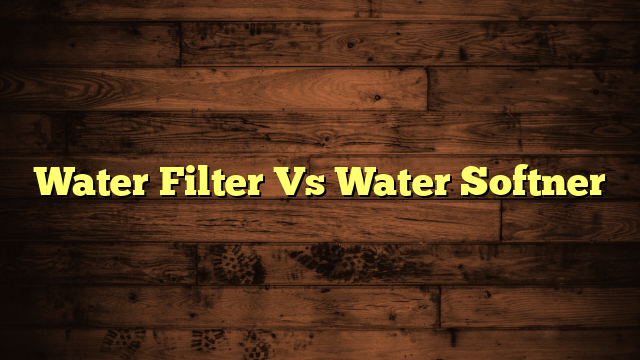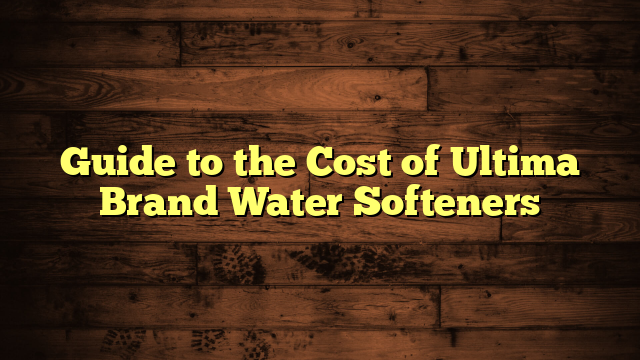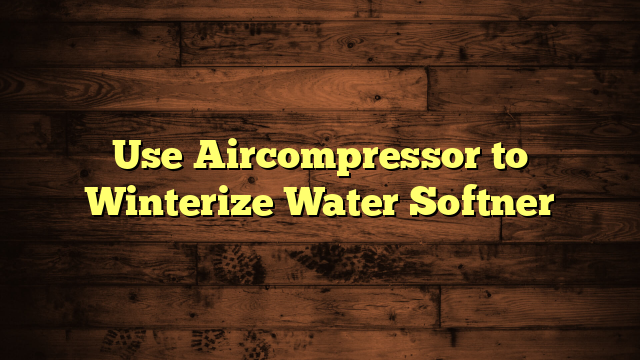Water Filter Vs Water Softner
Like the age-old debate between the sword and the shield, water filters and water softeners each offer unique advantages for maintaining your home's water quality. You might find yourself wondering which one suits your needs better, considering that filters focus on removing contaminants, while softeners tackle hard water issues. Each system has its own maintenance requirements and benefits, but understanding the core differences can be vital for your decision-making. So, what exactly should you prioritize when choosing between these two essential water treatment options?
Key Takeaways
- Water filters remove contaminants for cleaner drinking water, while water softeners reduce hardness to prevent scale buildup in plumbing.
- Filters improve taste and safety, whereas softeners enhance appliance longevity and efficiency by addressing hard water issues.
- Maintenance varies: filters require regular cartridge changes, while softeners need occasional salt addition and brine tank cleaning.
- Initial costs are generally lower for water filters, but consider long-term savings from both systems based on health benefits and efficiency.
- Evaluate lifestyle needs: filters enhance drinking water quality, while softeners improve skin and hair conditions along with household cleaning efficiency.
Definition of Water Filters
Water filters are devices designed to remove impurities from water, ensuring that you have clean and safe drinking water. They play an essential role in water filtration, employing various purification methods to eliminate contaminants, such as bacteria, heavy metals, and chlorine.
When you invest in a water filter, you're not just improving taste; you're also safeguarding your health.
There are several types of water filters available, including activated carbon filters, reverse osmosis systems, and UV purifiers. Each of these methods works differently to achieve the same goal: providing you with purified water.
Activated carbon filters trap contaminants through adsorption, effectively removing odors and tastes. Reverse osmosis systems push water through a semi-permeable membrane, filtering out even the tiniest impurities. UV purifiers use ultraviolet light to kill or deactivate microorganisms, ensuring that your water is free from harmful pathogens.
Choosing the right water filtration system for your needs depends on your specific water quality concerns. Whether you're facing hard water issues or simply want to improve taste, a good water filter can make a significant difference in the quality of your drinking water.
Definition of Water Softeners
While water filters focus on removing contaminants for safe drinking, water softeners tackle a different issue: hard water. Hard water contains high levels of minerals, particularly calcium and magnesium, which can lead to scale buildup in pipes and appliances.
By using a water softener, you can efficiently reduce these minerals, improving water quality and extending the lifespan of your plumbing system.
There are several water softeners types to evaluate, including salt-based, salt-free, and dual-tank systems. Salt-based softeners use a process called ion exchange to replace hard minerals with sodium ions, while salt-free systems employ a different method to condition the water.
Dual-tank systems can provide continuous soft water, which is ideal for larger households.
When it comes to water softeners installation, you typically want to place the unit near your home's main water supply. This guarantees all the water entering your home is treated.
Depending on your plumbing knowledge, you may opt for professional installation or tackle the project yourself.
Ultimately, investing in a water softener can greatly enhance your home's water quality, making tasks like laundry and dishwashing more effective.
Key Differences Between Systems
Understanding the key differences between water filters and water softeners is essential for making the right choice for your home. Both systems play significant roles in water treatment, but they serve distinct purposes and operate differently.
Water filters primarily remove impurities and contaminants from your drinking water, improving taste and safety. On the other hand, water softeners focus on reducing hardness caused by minerals like calcium and magnesium, which can affect your plumbing and appliances.
Here's a quick comparison to illustrate their differences:
| Feature | Water Filter | Water Softener |
|---|---|---|
| Purpose | Removes contaminants | Reduces water hardness |
| System Efficiency | Improves water quality | Protects plumbing systems |
| Maintenance | Regular filter changes | Regeneration cycle needed |
Benefits of Water Filters
Choosing a water filter can greatly enhance your home's drinking water quality. With a good filter, you'll notice immediate improvements in taste and clarity, ensuring you're drinking only the purest water.
One of the primary health benefits of using a water filter is the removal of harmful contaminants. By filtering out chlorine, lead, and other pollutants, you protect yourself and your family from potential health risks associated with unfiltered water.
Moreover, using a water filter has a positive environmental impact. Instead of relying on single-use plastic bottles, which contribute to pollution, you can refill your reusable bottle with clean, filtered water. This not only reduces waste but also saves you money in the long run.
Additionally, many water filtration systems are designed to be low-maintenance and energy-efficient, making them a smart choice for eco-conscious consumers.
Benefits of Water Softeners
Water softeners provide a range of benefits that can greatly enhance your home's water quality and overall comfort. One of the most significant advantages is the reduction of hard water minerals, such as calcium and magnesium. This not only helps improve your skin and hair but also increases the softener efficiency, making your appliances and plumbing last longer.
When you install a water softener, you'll notice a marked difference in how soaps and detergents perform. They lather better and rinse away more easily, which means you'll use less product and save money.
Furthermore, softened water can help prevent mineral buildup in pipes, reducing maintenance costs and extending the lifespan of your plumbing system.
The installation process of a water softener is relatively straightforward, often requiring only a few hours of work. Once installed, it operates automatically, requiring minimal upkeep.
You'll enjoy the benefits of softer water without the hassle of constant monitoring. Overall, investing in a water softener is a practical choice that enhances your home's comfort, saves you money, and improves your daily life.
Common Applications and Uses
Many households and businesses utilize water softeners for various applications that enhance water quality. In residential usage, water softeners can help prevent scale buildup in pipes and appliances, extending their lifespan. Plus, they make laundry feel softer and improve the effectiveness of soaps and detergents.
In industrial applications, water softeners play an essential role in processes that require high-quality water. They help maintain equipment efficiency, reduce maintenance costs, and guarantee product quality by preventing scale formation in boilers and cooling systems.
Here's a quick overview of common applications:
| Application Type | Description |
|---|---|
| Residential Usage | Soft water for appliances, laundry, and bathing |
| Industrial Applications | Preventing scale in boilers, cooling towers, etc. |
Choosing the Right Solution
When it comes to choosing the right solution for your water needs, it's essential to understand the quality of your water, the costs involved, and the long-term benefits.
You'll want to weigh factors like maintenance and how long each option will last to make an informed decision.
Understanding Water Quality Needs
Choosing the right solution for your water quality needs starts with understanding the specific issues present in your water supply.
Begin by conducting water testing to identify contaminants or hard minerals. You might discover that your water has high levels of chlorine, bacteria, or heavy metals, all of which can affect its safety and taste.
On the other hand, you may find that your water is hard, containing excess calcium and magnesium, which can lead to scale buildup in your appliances.
Once you know what's in your water, you can compare your results against established quality standards. These standards help determine whether you need a water filter, a water softener, or both.
If your primary concern is removing impurities like lead or chlorine, a water filter is likely your best bet.
However, if hard water is causing problems like soap scum and limescale, a water softener is essential for protecting your plumbing and improving the efficiency of your appliances.
Cost Considerations and Benefits
Understanding the specific water quality issues in your home sets the stage for evaluating costs and benefits.
Both water filters and softeners come with their own price tags, but looking at a cost comparison can help you determine which option offers better long-term savings for your situation.
Consider these three factors when weighing your options:
- Initial Investment: Water filters often have a lower upfront cost compared to water softeners. However, the type and model can greatly affect this.
- Operating Costs: Calculate the ongoing expenses for filter replacements or salt for a water softener. Regular maintenance can impact your budget over time.
- Health and Lifestyle Benefits: Think about the quality of water you and your family consume. Cleaner water can lead to health savings in the long run.
Maintenance and Longevity Factors
Evaluating maintenance and longevity factors is vital in deciding between a water filter and a water softener. Water filters often require regular filter upkeep, which means you'll need to replace the filter cartridges periodically. Some filters may need replacements every few months, while others can last a year or more.
It's important to check the manufacturer's guidelines to guarantee peak performance and water quality.
On the other hand, water softeners are designed for longevity. With proper care, they can last a decade or more. Maintenance typically involves adding salt regularly and occasionally cleaning the brine tank.
You'll want to monitor your system to make certain it's functioning efficiently, but the upkeep is generally less frequent than filter maintenance.
Ultimately, the choice depends on your specific needs. If you prioritize cleaner drinking water, a filter might be your best bet. However, if you're dealing with hard water issues, investing in a softener could save you from costly plumbing repairs over time.
Frequently Asked Questions
Can I Use Both a Water Filter and a Water Softener Together?
Yes, you can use both a water filter and a water softener together. Just guarantee your system compatibility; each improves water quality in different ways, providing you with clean, soft water for various needs.
How Often Should I Replace Water Filter Cartridges?
Think of your water filter as a loyal guardian, tirelessly protecting your health. Typically, you should replace those cartridges every six months to guarantee the best water filter lifespan. Don't let impurities slip through; stay vigilant with cartridge replacement!
Do Water Softeners Remove Chlorine From Water?
Water softeners don't remove chlorine from water. Instead, they primarily address hardness minerals like calcium and magnesium. If you're concerned about water quality, consider using a dedicated water filter for effective chlorine removal.
What Contaminants Do Water Filters Specifically Target?
Water filters specifically target various contaminants, including lead contaminants. Different filter types, like activated carbon or reverse osmosis, efficiently remove these harmful substances, ensuring you enjoy cleaner, safer drinking water for you and your family.
Is Maintenance Required for Both Systems?
Both systems require a little TLC to keep them running smoothly. You'll need to check maintenance frequency to guarantee peak performance, which ultimately boosts system longevity and keeps your water quality at its best.
Conclusion
In conclusion, choosing between a water filter and a water softener hinges on your specific water quality needs. If you're tackling contaminants for safer drinking water, a filter's your best bet. On the other hand, if hard water's causing pesky scale buildup, a softener will save your pipes and appliances. By understanding these systems, you can make an informed decision that enhances your home's water quality. So, what's it going to be—fresh drinking water or softer showers?







